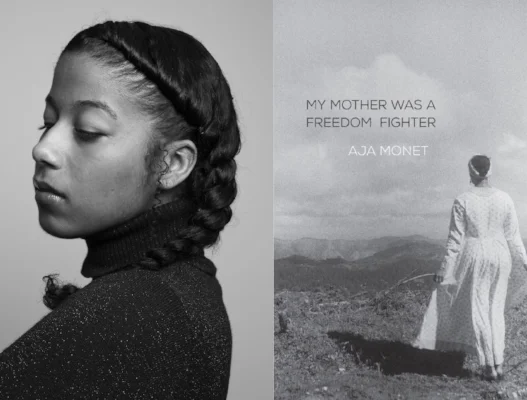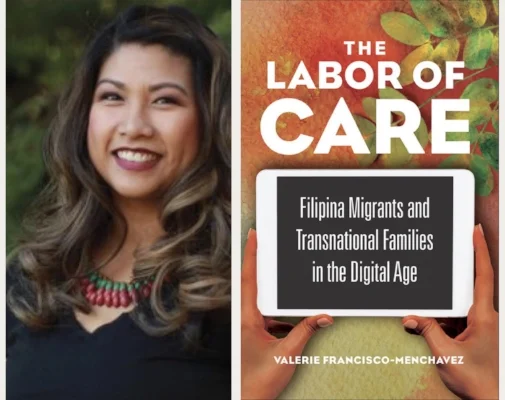#GetLit: May is for the Mamas
I used to hate the month of May. Not because I have anything against Tauruses or Geminis (haha, peace), but because I used to dread Mother’s Day. It’s not that it’s become synonymous to brunches, flowers and Hallmark cards (I actually like these things) but because I had a complicated relationship with who I was supposed to be celebrating -- my own mom.
Ever since I was a baby dyke, she was public enemy no. 1 in my world. We disagreed on many things: from academics, what kind of clothes I should wear, how I presented myself to the world, who I should like/love, where “home” should be. In every major shift in my life -- which has always been wrought with pain -- my mom was always dancing around the center.
It wasn’t until after I turned 25 that my relationship with her started to shift. And this time, it was towards a positive and agreeable direction, that had both of us on edge and wary at each other at first. But we were living in different times, having gone through many struggles separately and together: migration, family separation, discrimination and mental health issues to name a few. It was years of suffering and separation in the making but when we were both ready, we finally started to see each other.
In addition to learning about a political framework that examined how individual choices are shaped and driven by our economic/political/social conditions, I also had the gift of literature to guide and enlighten me. Over time, these things helped me embrace my role as my mother’s daughter.
Still, there were many times that I was too stubborn to let go of my grudges, clinging too tightly to my personal/historical narrative. Unable to work through my trauma on my own, it was literature that helped me break through my hurt self. Through the portable magic of books, I started to make space for narratives beyond my own. I read about the stories of other pained daughters, of distraught mothers. I learned about co-parenting, and also what it takes to maintain and sustain a maternal bond across oceans. I became a witness to grief etched on page, to joy that seemed to leap out of the material.
This Mother’s Day, I wanted to share some of the books that have imparted the kind of light I needed to understand my relationship with my mom. These are both fiction and nonfiction titles, mostly contemporary reading that have affirmed my own struggles, challenged my perspectives, helped me see my mother beyond her role. From me and my mama, to you and your mamas:
Ordinary Light (2015) by Tracy K. Smith
Ordinary Light is a memoir by Tracy K. Smith who wrote about her mother and their relationship beautifully. From her fondest memories up until her mother’s battle with cancer, Smith chronicles fleeting moments--each a world in its own--and threads them to give her readers the fabric of their bond. I reviewed this book back in 2016 and wrote: “The reading has not lessened my own suffering but my capacity to understand is finally in place.”
The Power (2016) by Naomi Alderman
Mentored by Margaret Atwood, author of the book that the series The Handmaid’s Tale is based on, Naomi Alderman wrote a book in the same vein with The Power. The science fiction novel reveals a world where women of all ages discover their power called “skein” -- electricity that hums and courses through their bodies. This superpower enables women to rule over men in the book, as jolts emanating from women’s fingertips can be fatal. Another aspect of the book that I found interesting is the concept of mothering. From the more traditional storyline of how far a mother will go to protect her daughter all the way to creating new families, this book will have you thinking about alternate worlds for real.
My Mother Was a Freedom Fighter (2017) by Aja Monet
I’ve long been a fan of Aja Monet and her vibrant poetry so I knew I had to get a copy of My Mother Was a Freedom Fighter when it came out last year. From the spoken word videos I played over and over again on Youtube to the pages within this tome of resilience, Monet’s poetry continues to radiate. She prefaces her poems with the inscription my mother was a freedom fighter and so were her mother and her mother’s mother, creating an emotional atmosphere of resilience throughout.
The Ministry of Utmost Happiness (2017) by Arundhati Roy
This highly-anticipated novel by Arundhati Roy is a sweeping tale of personal and political liberation, a book about hijras (the term used to describe the transgender community in India) and the Kashmiri conflict. The Ministry of Utmost Happiness touches on many issues, but it is notable for the way it explored motherhood. When one of the initial characters asked Is it possible for a mother to be terrified of her own baby? I dove right in. One of this novel’s strengths is how it portrayed the agency of mothers, how they recreated what that meant for themselves and how their chosen families ultimately trumped blood connections.
Little Fires Everywhere (2017) by Celeste Ng
One of 2017’s acclaimed books which is now in the works for a TV mini-series, Little Fires Everywhere by Celeste Ng delves into the lives of two families in suburbian Ohio. In this tale, Ng dissects and challenges the notion of the quintessential nuclear family. At the center are two mothers, each trying to raise her kid(s) in the best way possible, even if it meant getting in the way of the other. In my review for this book, I wrote: “I’m not sure if this is a huge trend right now, but small-town stories with the kind of big love you didn’t expect are all over. If there’s one you should read, let it be this one.”
Red Clocks (2018) by Leni Zumas
Red Clocks by Leni Zumas is probably one of the most inventive books I’ve read in awhile, in that it is written in an unusual but extremely captivating form. It follows the lives of women at a time when laws banning abortion & adoption of children by a single parent are about to enforced. There’s different kinds of mothers in Alderman’s tale: tired mothers, estranged mothers, women hoping to be mothers, reluctant would-be mothers. Red Clocks is a chilling story, a cautionary tale of what happens when women are left with no choice when it comes to their own bodies.
The Labor of Care (2018) by Valerie Francisco-Menchavez
There’s nothing quite like reading something that hits so close to home. In The Labor of Care by Valerie Francisco-Menchavez, the lives of Filipina migrant women take center stage. She recounts the heartbreaking experiences of Filipinas being separated from their families, as they seek work in other countries and send money back home. But what is unique about Francisco-Menchavez’s book is that it injects and offers a sociological perspective--one that is hopeful, uplifting--in the struggles of families to maintain a strengthened intimacy in spite of physical proximity.
In many ways, reading brought me closer to my mom. She spoke to me through the stories I read, as I understood her own pain. I saw my mom not just as my mother, but as a fellow immigrant, a Filipina, a woman of color trying to survive and thrive in this world.
***
This year, consider supporting black incarcerated mamas by donating to the National Mama’s Bail Out. You can also donate to the Puerto Rico Rising Fund, a response fund that will support youth, women and organizers to take care of themselves and their communities.
Pia Cortez
INSTAGRAM - WEBSITE
PRONOUNS: SHE/HER
Pia Cortez is a Bay Area-based community organizer and the creator of Libromance, a blog dedicated to book reviews and literary features with a queer Pinay immigrant perspective. She believes in the power and beauty of the written word: how stories stretch time and transcend boundaries, how books simultaneously challenge and console, how reading becomes an act of resistance. Pia hopes to transform reading from a solitary pursuit and turn it into a tool for community-building, a catalyst for ruckus-raising. When she’s not currently reading the world, she’s experimenting with #booklooks, a play on books and fashion.





















